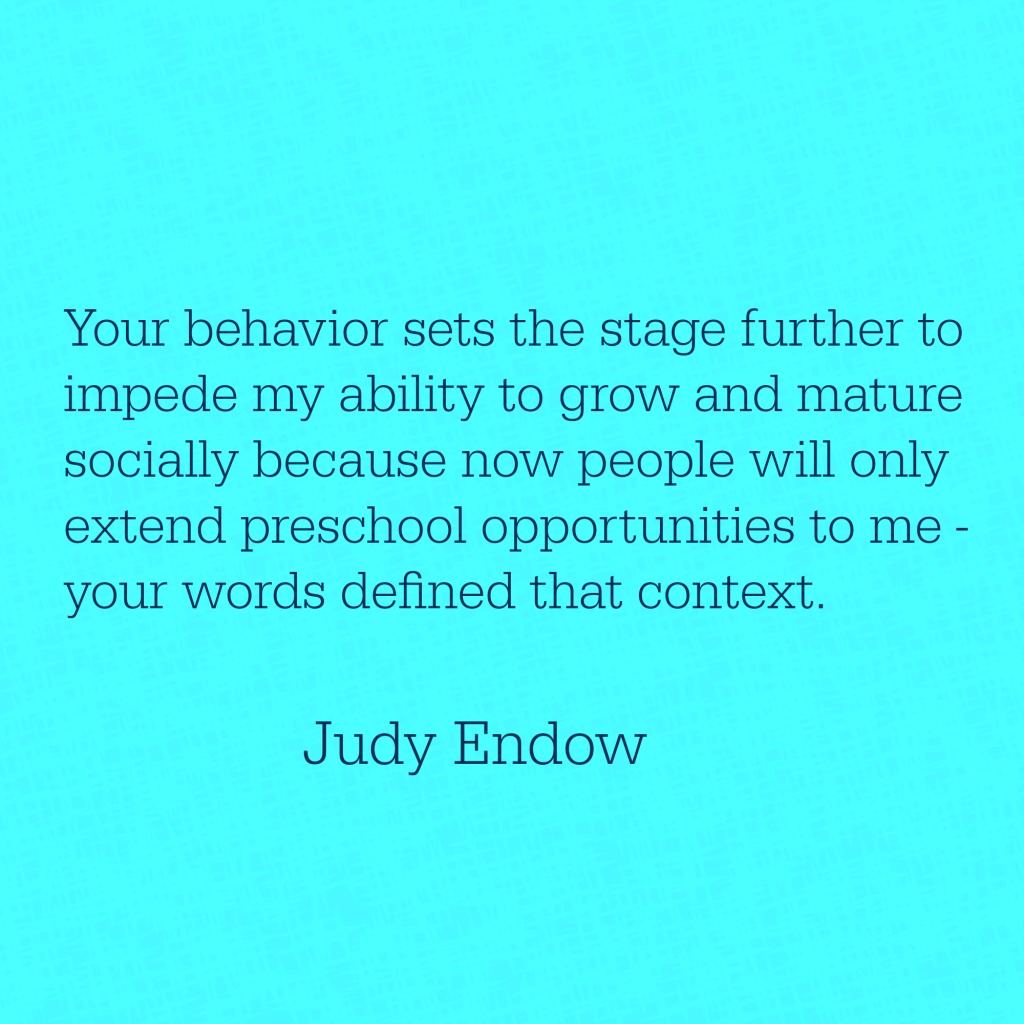As an autistic, I have difficulties in the social arena in a multitude of ways. This was especially true during my growing up years. Even today as an adult, automatic social understanding is not my strong suit. I am, however, able to continually learn new things that enable me to do and be all I want in this world.
Today, in my professional work I am able to provide some input to a variety of organizations and schools in regards to individuals with an autism label. One thing I consistently see regardless of where I go is the practice of therapists and teachers referring to all the children in the group as each other’s friends. This practice feels right and good in preschool groups. Beyond that, the older the children, the more uncomfortable I become when I hear the adult defining all group participants as friends.
How Friendship Changes Over Time as Children Grow Up
I would like us to think about how the concept of friends changes as children grow and mature socially. When in preschool, a small child’s relationships are primarily with adults. Other children are defined as friends only when they are in close proximity, such as in the same room. This slides into the early primary grades for some, but not all, children. An example that illustrates this is birthday parties. In the very young grades, it is not unusual to invite everyone in the class to a birthday party because they are all friends.
As children go through grade school they grow and develop in all sorts of ways, including the way they define and participate in friendship. They come into a co-operative friendship style, meaning they co-operate fairly with others. Children this age will spend time making the rules and deciding who is in and who is out of their friendship circle. Often this is short-lived and a new circle or club will soon be formed. If they do something nice, they expect the other person then must do something nice in return.
As children mature they stop keeping score in their friendships and they start confiding thoughts and feelings to a select few whom they have identified as friends. They are able to help each other problem solve. Often during this stage of development children have the joined-at-the-hip experience of a best friend.
As teens navigate through high school friendship begins to become defined by the experience of emotional closeness. There is less possessiveness and individuals often have more than one circle of friends. Trust and support are highly valued as is remaining close over time, even if separated.
As I grew up, my autism meant that I was not on par with same-aged peers in my friendship development. This is the case with most children with autism that I see today. Often our individuals are put into social groups in an effort to give them support in an area that poses difficulty. In these groups there is a common practice of the leaders referring to all the group members as each other’s friends, regardless of the age or the development of the individual participants.
Referring to all kids in the group as friends is a preschool practice. It works well in preschool because, in reality, all of the children really are friends! After this period in life, not all participants define their friends by proximity. In the case of developmental differences older children may be developmentally at a younger age. It may seem reasonable to target social connection at the current developmental level, referring to all the children in the group as friends. I have done this myself, but I am now questioning this practice.
I am reflecting on my own growing up and I know that when working one on one in a therapy session it was beneficial for the therapist to meet me at my current developmental level. For example, I can remember talking about how a friend was not sharing back and how wrong that was when I was seventeen. This area of friendship understanding typically happens during early grade school years, but at seventeen, that reflected my social development level.
This mismatch between chronological age and social development is par for the course for those of us with autism. Even so, addressing a group of teens as if they were preschoolers is not only quite disrespectful. It is indeed ableist!
Personally, I am willing to work on what is difficult for me, but I do not appreciate my difficulties being underlined publically. I do not want you to broadcast your assumption publically that I am socially at a preschool level. You see, even if I am at a preschool level in the area of friendship development, when you interact as if I am a preschooler others assume my intellect, my interests and my whole being are preschool levels. When you refer to everyone in the room as my friends, regardless if I know them or not, assuming a preschool concept of friendship development, it invites the rest of the world to see me as incompetent and they then treat me as a young child. Your behavior sets the stage further to impede my ability to grow and mature socially because now people will only extend preschool opportunities to me – your words defined that context.
I wonder when I observe groups today if older children and teens feel “less than,” “othered” or “treated like a baby” when the group leader starts by saying the usual, “Let’s do a check in with our friends.” Even when I was developmentally at the stage of defining my friends by proximity, intellectually I knew others my age did not do it that way. In fact, I knew that was one of the reasons I was in the social group!
I have more questions than answers at this point, but for now, in my practice, I do not use these sorts of phrases in group settings. Instead, I am addressing and supporting friendship at an individual’s developmental level in private sessions. I am utilizing age appropriate – rather than developmentally appropriate – language in group sessions. I do this out of respect. It never felt good to me as a teen when others interfaced with me as if I were much younger, treating me like a baby and assuming my incompetence. This is why I begin any older-than-preschool groups with, “Let’s check in with one another.”
 JUDY ENDOW, MSW
JUDY ENDOW, MSW
Judy is an autistic author and international speaker on a variety of autism related topics. Read more from Judy on Ollibean here and on her website www.judyendow.com.







[…] being in a situation where three friends have decided to go to a movie together. Jane offers to pick up Mary and Cathy. Both Mary and Cathy […]
But the scorekeeping DOESN’T end. I’m nearly 60 and am still getting told by ex-friends that I’m not reciprocating properly. I deliberately began to try to be more generous with my friendship, and do tangible nice things for my friends. Including running a fundraiser so my friends could move, after which they told me I was inadequate as a Human Being and ii should try to be nicer and unfriended me. So I really don’t get the part about not keeping score or what a friend is supposed to be anymore.
Even more than being patronising, addressing groups as friends when they may be acquaintances or even people who have no particular liking for each other makes it more difficult to understand the concept of friendship. This is true, even for very little children, who often understand this as “teacherspeak”. Imagine the confusion of the Autistic child who calls out that xxxxx is not his friend because he is mean and is then told that everyone in the class is a friend. Say what you mean and mean what you say.
Judy Endow! So brilliantly articulated. All the issues I’ve been puzzling over for a long time (explains the offense I have often taken and struggled with while interacting with well-meaning school people – and others – involved in circles of support, buddy systems etc.) Thanks for providing the needed nuance.
Very illuminating! As an autistic person, I can find it hard to share secrets, such as being an autistic activist, writer, and blogger, which is perhaps one of the biggest cornerstones of my life, especially of the people in question are neurotypical, not to be prejudiced. I have shared and opened up to non-autistic and neurotypical people in my life, but that is usually only after going through a lot with them, such as living together, or the death of a mutual friend. I wish I could share these secrets more easily, yet it is hard with years of discrimination and stigma. For me, the people this post identified as friends in an older age are often the people who you know early on that you will treasure throughout your life.
This post explains some of the language people have used with me in the past that stood out as strange but I wasn’t sure why it seemed strange or why the person was using strange language with me. Thank you.
This is really interesting as it addresses the differences between communication with individuals one to one and within the group context. As well as having an autistic son, I teach autistic high schoolers and this has given me a valuable perspective. Lynda Blackburn this would interest you.